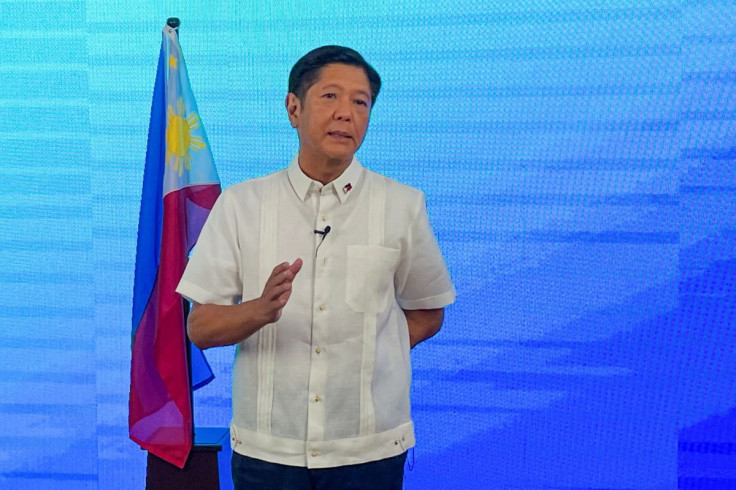Despite Sea Of Troubles Philippines President-Elect Marcos Jr Will Cozy Up To China

The Philippines has protested against China's unilateral fishing ban in the resource-rich and busy waterway in the South China Sea even as president-elect Ferdinand Marcos Jr. is all set to court China as part of his promise of policy continuity.
The Philippines filed a diplomatic protest on May 30 against China's annual fishing moratorium in the South China Sea for three and a half months as it covers parts of the West Philippine Sea.
According to the foreign ministry, the ban undermines the mutual trust, confidence, and respect that should underpin bilateral relations, as affirmed most recently by President Rodrigo Duterte and President Xi Jinping during their summit on April 8."
This year's ban, which came into effect from May 1, covers some areas of the South China Sea up to waters north of the 12 degrees north latitude. The Philippines ministry said that a moratorium "that extends to the West Philippine Sea has no basis in law."
According to the ministry, the ban is not limited to Chinese fishing vessels and is against the 1982 U.N. Convention on the Law of the Sea (UNCLOS) and the 2016 arbitration tribunal's ruling that invalidated Beijing's claims on the strategic waterway. The Hague-based Permanent Court of Arbitration declared in 2016 that Beijing's claim on the waterway was without basis. But China has ignored the decision.
The ruling upheld the Philippines' sovereign rights in a stretch of coastal waters called its exclusive economic zone.
The Chinese embassy in the Philippines has yet to react to the complaint by the Philippines.
The ministry is also concerned at recent violations of Philippine rights in Second Thomas Shoal and Reed Bank, which fall within the Philippines' exclusive economic zone but over which China has also staked claims.
The outgoing President Rodrigo Duterte wanted warmer ties with China and set aside the tribunal's ruling over promises of Chinese trade and investments.
Marcos Jr., popularly known as "Bongbong," is expected to follow Duterte's suit, which he revealed during a telephonic conversation with Chinese President Xi Jinping recently.
However, in his latest comments, the 64-year-old Marcos Jr. said that he would not "allow a single millimeter of our maritime coastal rights to be trampled upon".
On April 13, the ministry summoned a senior Chinese embassy official in Manila following an altercation between a maritime research vessel and the Chinese Coast Guard.
The offshore survey was a joint venture between the Philippines Department of Science and Technology and the National Central University in Taiwan, aimed at mapping geologic features that could set off earthquakes, tsunamis and other natural hazards. It was part of Taiwan's New Southbound Policy, an initiative of President Tsai Ing-wen to improve ties with South and Southeast Asian nations.
The Philippines has registered hundreds of diplomatic protests against China in recent years for the alleged acts of aggression in the disputed waters, though ties between the two countries have improved under Duterte, whose six-year tenure would complete at this month-end.
The maritime territorial conflicts will be the key challenge president-elect Marcos Jr. will have to face when he takes office after a landslide victory on May 9.
He has hinted at using diplomatic methods with China to find a solution, the same approach followed by Duterte, who did not take a more aggressive stance against Beijing's assertive actions in the South China Sea. Vowing to prevent any foreign interference in the running of his country, the president-elect recently said he would uphold the international ruling against China over disputed waters.
On May 18, Reuters quoted Marcos Jr. as saying that the Philippines will expand its ties with China and will shift them to a higher gear when he assumes power.
The pro-China stance of Marcos Jr, son of Ferdinand Marcos who ruled the country for two decades before being ousted by a people's revolt in 1986, and his running mate Sara Duterte, daughter of the incumbent president, could complicate the relationship with the Philippines' historical ally, the U.S.
Vietnam, Taiwan, Malaysia and Brunei have been locked in a stiff territorial conflict with China in the busy waterways for decades. Vietnam also condemned the Chinese annual fishing ban this month for violating its territorial jurisdiction. China has staked claim over nearly all of the South China Sea's resource-rich waters, through which at least $3.4 trillion of annual trade passes.
With its financial diplomacy, big infrastructure projects, and increased presence, China is the Philippines' top trading partner with investments running over $17.46 million in the first half of 2021 under Duterte.
Though Marcos Jr. is yet to unveil a clear foreign policy agenda, he may opt for a middle ground -- leaning strategically toward the U.S., with which the Philippines has a defense alliance, and economically toward Beijing.
The growing rivalry between the U.S. and China, and the Philippines' strategic location, make the Southeast Asian nation an invaluable ally for both the U.S. and China.





